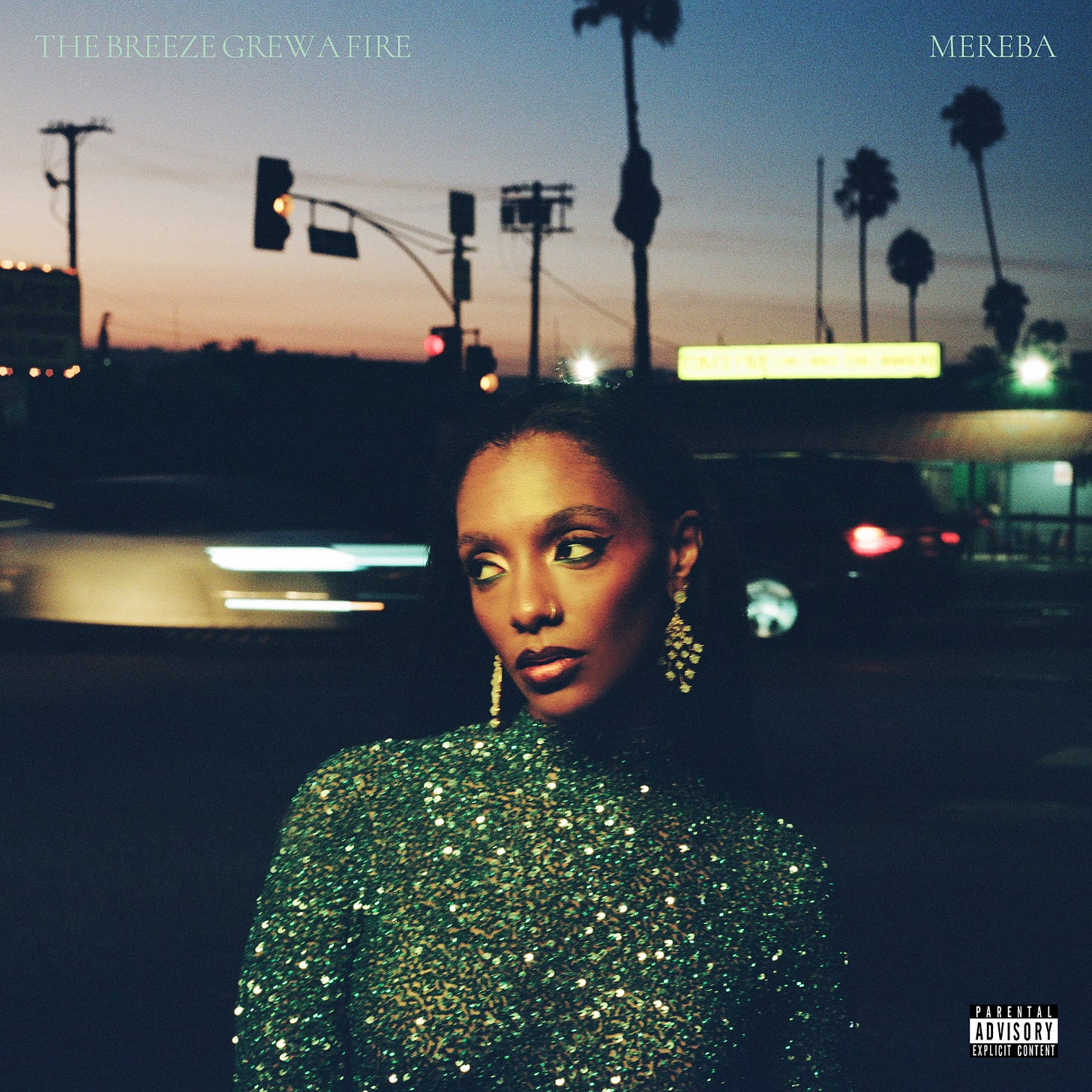Mereba: The Breeze Grew a Fire (Album Review)
Mereba urges the public to protect their inner balance as a sanctuary and refocus, without losing sight of the importance of standing together. May she be heard.
There, there exist poems and melodies full of fluctuations, simple yet groove-inducing drum loops and mesmerizing beats, and the dim light of dawn and the night breeze—with sparks that scatter and flames that blaze—each of which is certainly captured. The music video for Mereba’s “Black Truck” (2018) is shot by James Laxston, also known as the cinematographer for works such as “Moonlight” (2016), visually bringing out the mood of her song in the most optimal way. This video, which ends with her sleeping in a hammock just as it began, is staged as if everything were a dream, leaving the ambiguity in the hands of the listener.
The very presence of the artist known as Mereba, who hails from Montgomery, Alabama, is indeed somewhat elusive, and for that very reason, she is also compelling. Having moved with her family to North Carolina at an early age, she learned instruments such as the guitar and piano there. Later, while living in several places—including spending a year in Ethiopia, the land of her father’s roots—she eventually arrived in Atlanta and joined Spillage Village, the crew that includes EARTHGANG, JID, and 6LACK. There, through collaborating with the friends she met and creating music, she made her name known in the scene, and now she is based in Los Angeles. One might be able to overlay Mereba’s background—shaped by moving through many places and rooted in diverse musical influences—with her abstract image.
Yet, it is also certain that even when she was creating her previous work, The Jungle Is the Only Way Out (2019), her songs—already made after shifting her base from Atlanta to Los Angeles—eloquently narrated, without averting their gaze from the everyday violence and oppression faced by Black people, the nature of her own body, and the places in which she exists. Including the EP AZEB, released in 2021, her work is an extremely political record about love that is at once modest and dynamic, as well as a document of existence and struggle. Within the blurred beauty of her music, like the neon lights of the night, the tension of the streets lurks (moreover, her recurring sentiment in AZEB that “the world feels as if it is at war” may, for us who now mourn Israel’s incursion into Gaza, resonate with a different weight).
In addition, the film Queen & Slim (2019), for which she participated on the soundtrack with the track “Yo Love” alongside Vince Staples and fellow 6LACK, is a story depicting the flight of a Black couple who, while on a date, end up fatally shooting a racist white police officer in self-defense—a depiction that precisely portrays the modern American escape (or struggle) of love. In 2020, the racial tensions in American society, once again exposed worldwide, became a critical issue for the existence and continuity of love among Black people; conversely, in the film released just before that, continuing to love was itself an act of resistance.
As you might expect, this aspect also resonates with Mereba’s lyricism. In other words, while her music is certainly fantastical, what she is actually singing about are things with very clearly defined contours—such as the violence inherent in social structures and acts of love that resist it. And above all, it is about confirming and protecting one’s own existence. In a society that continues to sway and tries to tear apart the individual body across various places, seeking something certain was the recurring theme of her soul, her folk-like singing, and even her rap and poetry.
Her first full album in six years, The Breeze Grew a Fire, is, if I may use that term, a universal story. In contrast to the radical nature of AZEB, this work focuses on introspective expression and also possesses a vibrant, eclectic pop quality in progress that seems likely to appeal to even more listeners than The Jungle Is the Only Way Out.
The sense of loss depicted in this work, as well as the longing for freedom or reassurance, is acute, yet she engraves those emotions and desires into sounds and stories even more colorful than before. For example, listen to the first three tracks: “Counterfeit,” which shows relaxed-vibe rap with catchy choruses and the power of songwriting; “Ever Needed,” a love song that blends glossy neo-soul with reggaeton-like vibes; and “Phone Me,” riding on a synth track with a reclusive sonic image. So many drawers and such abundant staging power—just in these first few minutes, you are drawn in.
On the other hand, “Hawk” is a song dedicated to a close friend of hers who has passed away, yet the overall tone is painted with a danceable beat and rap, and in “Wild Sky,” the theme of death emerges along with a grand soundscape. The occasional scent of death lurking within the album is not merely a figment of the imagination but does not cause the entire work to become dark and gloomy. She consistently shows a light stance throughout the album—it might even be described as a celebratory vibrancy.
A sound and a voice that seem to make your feet lift off the ground, that do not allow you to grasp a concrete substance—amid that, she gently sings “You are an original being/Don’t fake yourself” (in “Counterfeit”). In The Breeze Grew a Fire, while confirming the presence of a passionately tearing love and the existence of death lurking close by, there is also an image of her that is more filled with conviction than in her previous works. Amid the flickering flames, her song, as if capturing each and every one of the blurred city lights into focus, brings into clarity the existence of herself and each one of us who listens.


